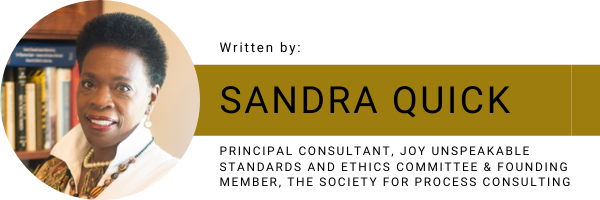.png) Timing is everything. Many believe these are “the worst of times.” Yet these are “the best of times” to exercise resiliency to make your process consulting practice sustainable.
Timing is everything. Many believe these are “the worst of times.” Yet these are “the best of times” to exercise resiliency to make your process consulting practice sustainable.
I am reminiscing for the THEN, BC - Before Contagion™. I had consulting dates on the calendar and clients promptly returning phone calls and emails. Back THEN, clients engaged in meaningful conversations as I helped them gain a clear vision of their future and the steps needed to get there. THEN, I was not hesitant about staying in a hotel or flying to their destination. THEN is past, we are in the NOW. And I move on.
NOW is the 2020 COVID-19 global pandemic. In the NOW I have financial stress. Do I continue to support the charities which are in desperate need or do I use those limited resources to pay bills? I just cancelled my $1M business liability insurance. I discontinued my virtual office space and put money into upgrading my website to increase online presence and to be more culturally in tune with my potential clients.
In the NOW I have emotional stress. I suffer from grief for my loss of control over my day-to-day life. In the NOW I have cultural stress. What do I do if the client insists on meeting face to face, in a closed room with 8 people at a 10-person table who are not wearing masks? My cultural position is to obey all of the health and safety recommendations of the scientific community which means I am NOW culturally incongruent with my clients. How do I honor my values and beliefs as I attempt to follow the federal, state and local virus protection regulations? I continue to build resiliency skills to strengthen my cultural capacity to emerge from NOW into NEXT.
I have moved on to NEXT: the time of AD - Active Doing™. NEXT is the state of Active Doing to exercise strength training by building capacity for resiliency. Resiliency is defined as “the capacity to recover quickly from difficulties; toughness.” Being more resilient means I am better able to navigate life’s challenges from a place of strength and conviction.
Amit Sood, MD, Mayo Clinic, offers an additional explanation, “resiliency is the core strength you use to lift the load of life.” These are the “best of times” to practice Active Doing by building resiliency to make my process consulting practice sustainable. There are nine attributes of resiliency skill building. I am hopeful that you are practicing some of these in the NOW. They include:
- Connection - reaching out with a "good news" email;
- Gratitude - being thankful for what you have;
- Kindness - doing something nice for somebody;
- Optimism - being certain that this uncertainty will end even if the NOW looks bleak;
- Composure - staying calm, breath in-breath out, in the midst of confusion and frustration;
- Patience - longsuffering with people and/or situations that confound you;
- Sense of purpose - focus on the reasons you started this process consulting practice in the beginning—to help people;
- Forgiveness - both for others and for yourself; and
- Acceptance - for those things you cannot change.

How can you incorporate these resiliency attributes into your daily practice? What would that look, sound and feel like? What’s your investment worth?
Journey with me and fellow consultants to NEXT where we are Actively Doing resiliency skill building in a 9-week course: Building Cultural Congruence through Resiliency. The value is in the capstone project. You will address/resolve a personal or professional NOW culturally INcongruent issue that would build your capacity for resiliency in preparation for the NEXT. The subsequent Plan of Action, using those resiliency skills, has the potential to benefit you, your family and your business or ministry.
The course starts in mid-July 2020 (dates TBD) and fulfills the requirement for credential renewal for Certified Process Consultants.
Contact me at joyunspeakable7@gmail.com to discuss how this course might help you build your resiliency, cultural congruency and consulting capacity.
- Sandra Quick

Sandra Quick is the Principal Consultant at Joy Unspeakable, LLC, a founding member of the Society for Process Consulting and a member of its Standards and Ethics Committee.